SilverStone Shark Force 160 ARGB Review
Introduction
There are a lot of interesting fans out there. Some have little indentations that make them interesting. Others come at insane speeds. The Shark Force, on the other hand, has size on its size. Being 160mm big is interesting on its own, but the 140mm mounting holes make it compatible with many standard cases. Let's find out more!
Positive
- Excellent Performance
- Good Noise-to-Performance
- Build Quality
- Surprisingly Ridgit Fram
- 140mm Fan Mounting
Neutral
- 160mm not always compatible
- RGB not reaching outer border due to size
Negative
- Could be a bit quieter
- Proprietary connections are fragile
What's in the Box?

A SilverStone Shark Force 160 ARGB fan comes in a nicely designed and rather thick carton box showing off some imagery and some specs.
Inside we will find the following items:
- Shark Force 160 ARGB Fan
- Proprietary - to 4-Pin PWM adapter/extension
- Proprietary - to 3-Pin ARGB adapter/extension
- Mounting screws
Once we have the whole package unboxed the fan is ready to be installed.
Down below we added a short summary of the Fan's specs.
| Name | SilverStone Shark Force 160 ARGB |
| Size | 160x160x25mm (140mm-Style mounting holes) |
| Speed | 1600RPM |
| Airflow | 160CFM |
| Static Pressure | 2.21mm/H2O |
| Noise | < 38.1dBa |
| Connection | Proprietary ARGB + PWM adapter to regular 4-pin +3-Pin |
| Bearing | 3-Phase 6-Pole Fluid Dynamic Bearing |
| RGB | RGB illuminated from the center |
Installation
Although a Fan installation is usually an easy step during a PC build, installing a Shark Force does require some preparation.

Due to the Fan's 160mm size, it will not be as easily compatible as a regular 120- or even 140mm fan.
There are a couple of cases, such as the SilverStone Setha or many Cooler Master Hufs, that are designed for enormous intake fans, even much bigger than 160mm.
The Shark Force, however, is meant to bring 160mm fan size in a 140mm installation form factor. If you were to lay a regular 140mm fan over a Shark Force, you would notice that the mounting holes are identically spaced out.

Although it is meant to be used on 140mm fan spots, compatibility is not always given as the fan is still wider and higher at its widest and highest points. Therefore, we highly recommend triple-checking the front of your case for compatibility. You can easily do this by cutting out a 160x160mm piece of carton and positioning it where you want to install the fan. If there is no resistance of any sort while positioning the carton, you will be fine.

Although mounting down the fan using 4 of the included screws is nothing out of the ordinary, connecting the fan is.
On one edge of the fan's frame, we will find 2 proprietary ports, one marked with "Fan" and another one marked with "LED".
In order to connect the fan we are required to use the proprietary-to-not-proprietary adapter included in the box.

A highly positive side-effect of those proprietary ports is that in case of multiple fan installations, we can utilize the additional male header present on both cables to daisy-chain one fan to another one. This not only creates a lot less cluster than regular PWM and ARGB splitters but also allows us to keep using a single port to control multiple fans.

Appearance
Interesting would be a complete understatement. Although there might not be a lot of "special" about a central illuminated fan, the Shark Force's size surely is.
By spreading out the fan wings thanks to reducing the outer border but keeping the same mounting hole spacing, SilverStone created a fan that is both, enormous, and not really enormous at the same time.
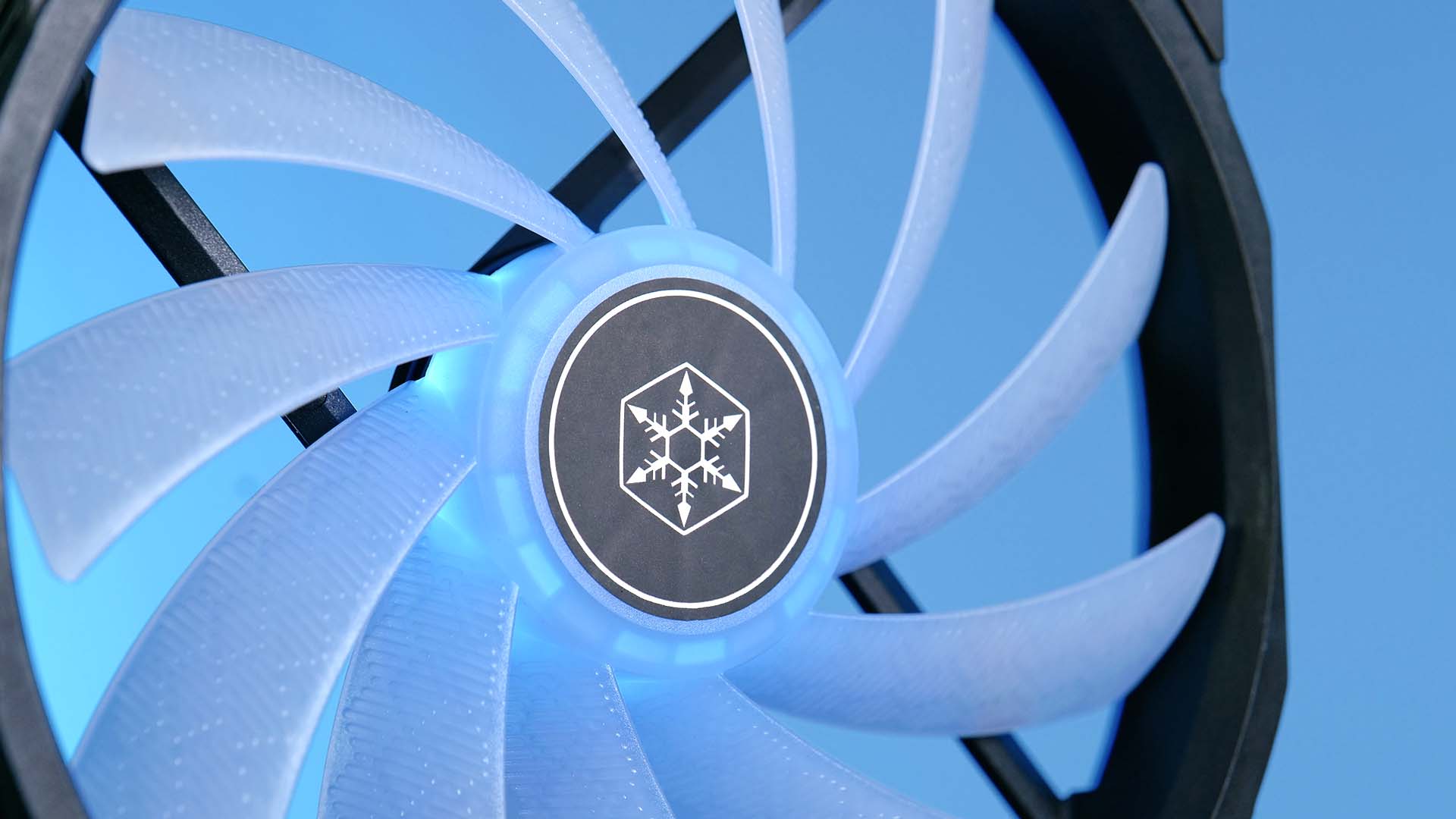
That being said, we initially believed that the fan frame reduction must have come at the cost of lower quality or rigidness. However, this is not the case. Thanks to several reinforcements, we did not witness any sort of weak fan frame.
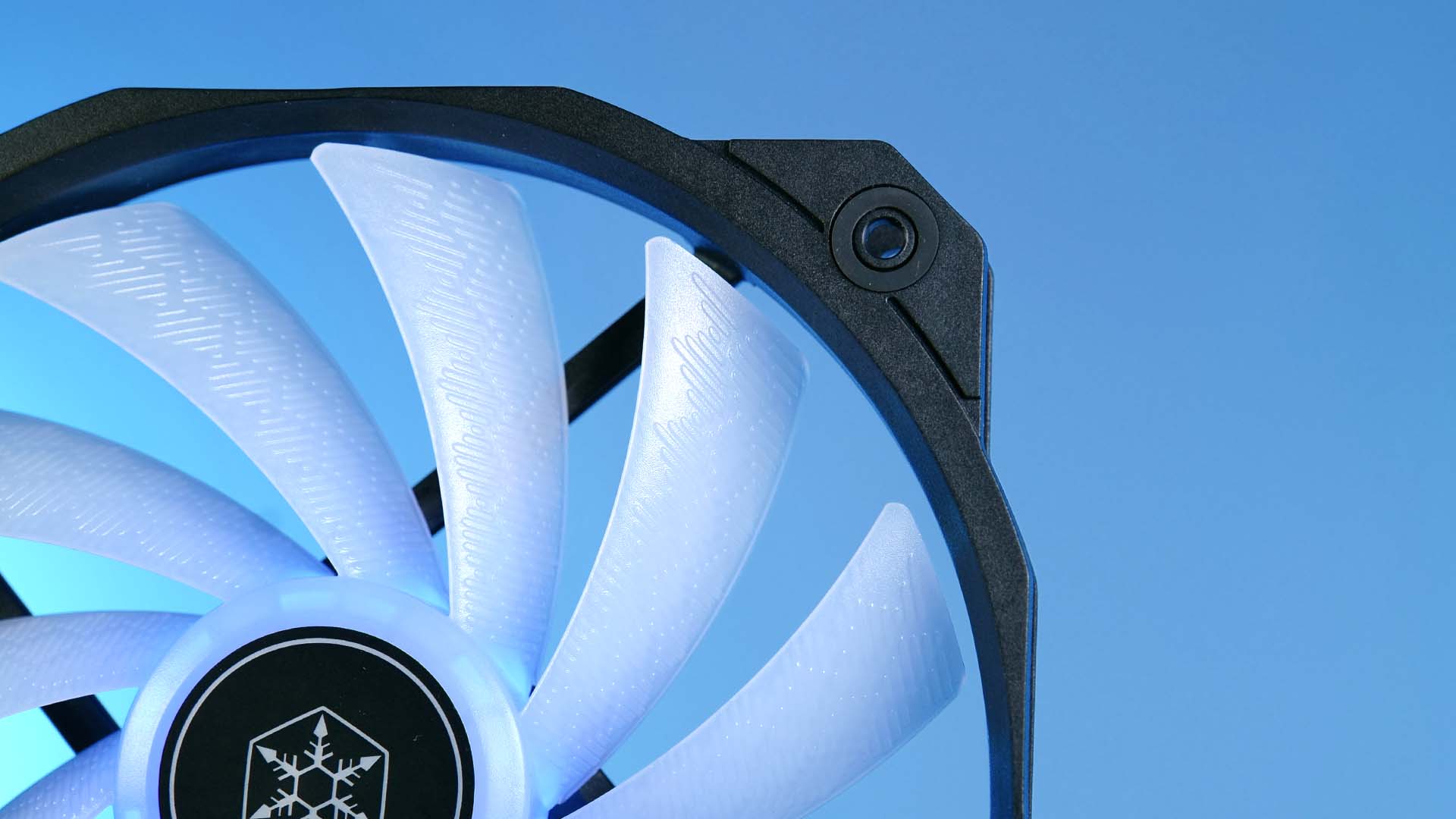
The ARGB implementation is also an interesting aspect. The light is spreading out of the central fan hub and travels across the milky-acrylic wings which are plastered in a "Shark Force Skin" pattern. Although we can confirm that the LEDs used for the Shark Force are really bright and could be compared to the ones used on the best fans, the sheer size of the Shark Force makes it impossible for the light to travel all across the fan blades. However, as this is not due to the usage of low-quality LEDs but due to the Fans size, we believe that this is acceptable behavior.
Benchmark
Although we did not yet benchmark a 160mm fan using our standardized 120 & 140mm fan testing setup, we came to discover that we are indeed able to mount a 160mm fan to it. Therefore, we benchmarked the Shark Force as we do with any other fan.

Letting them spin at their max 1600RPM, the giant 160mm Fans were capable of keeping the CPU at 38.6°C. This is an excellent result placing them just in front of the notorious Noctua NF-A12x25.
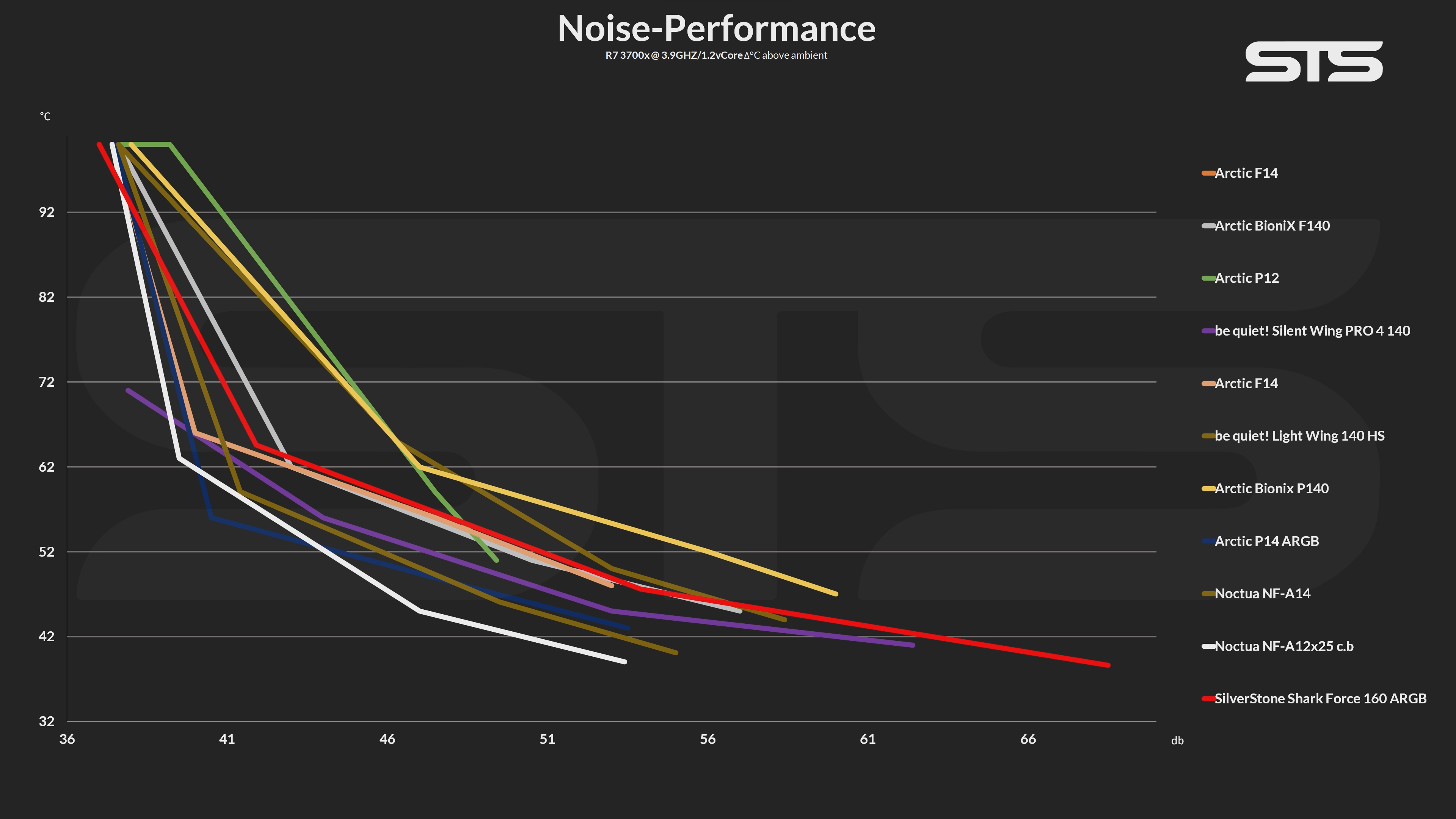
On the Noise to performance side, the results changed a bit, but not too much.
Although the Shark Force did not manage to keep the same Noise-to-Performance ratio like an NF-A12x25, they did manage to perform similarly to an Arctix BioniX F140 or F14, but with a lot more potential performance headroom, which once used, would come at the cost of additional noise.
Conclusion
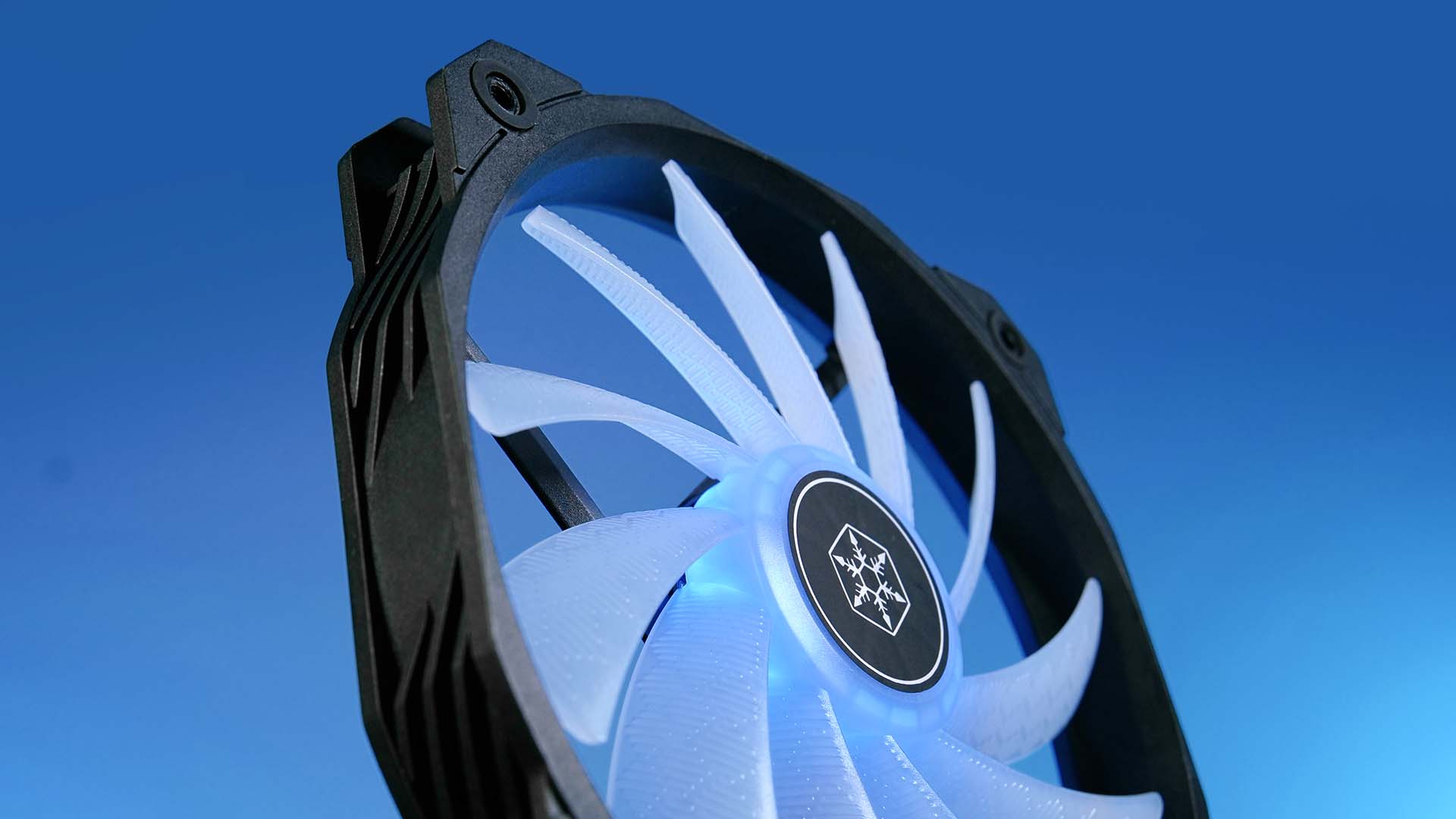
Overall, SilverStone's Shark Force 160 ARGB fans are very interesting. By reducing the frame thickness and removing any unnecessary overhang, SilverStone managed to expand a regular 140mm fan to a 160mm Fan size without making the actual Fan bigger.
Although we expected this to come at the cost of lower fan frame rigidness, it did not. The overall fan build quality is excellent with nothing moving too much or being built in a weak and quickly breakable way.
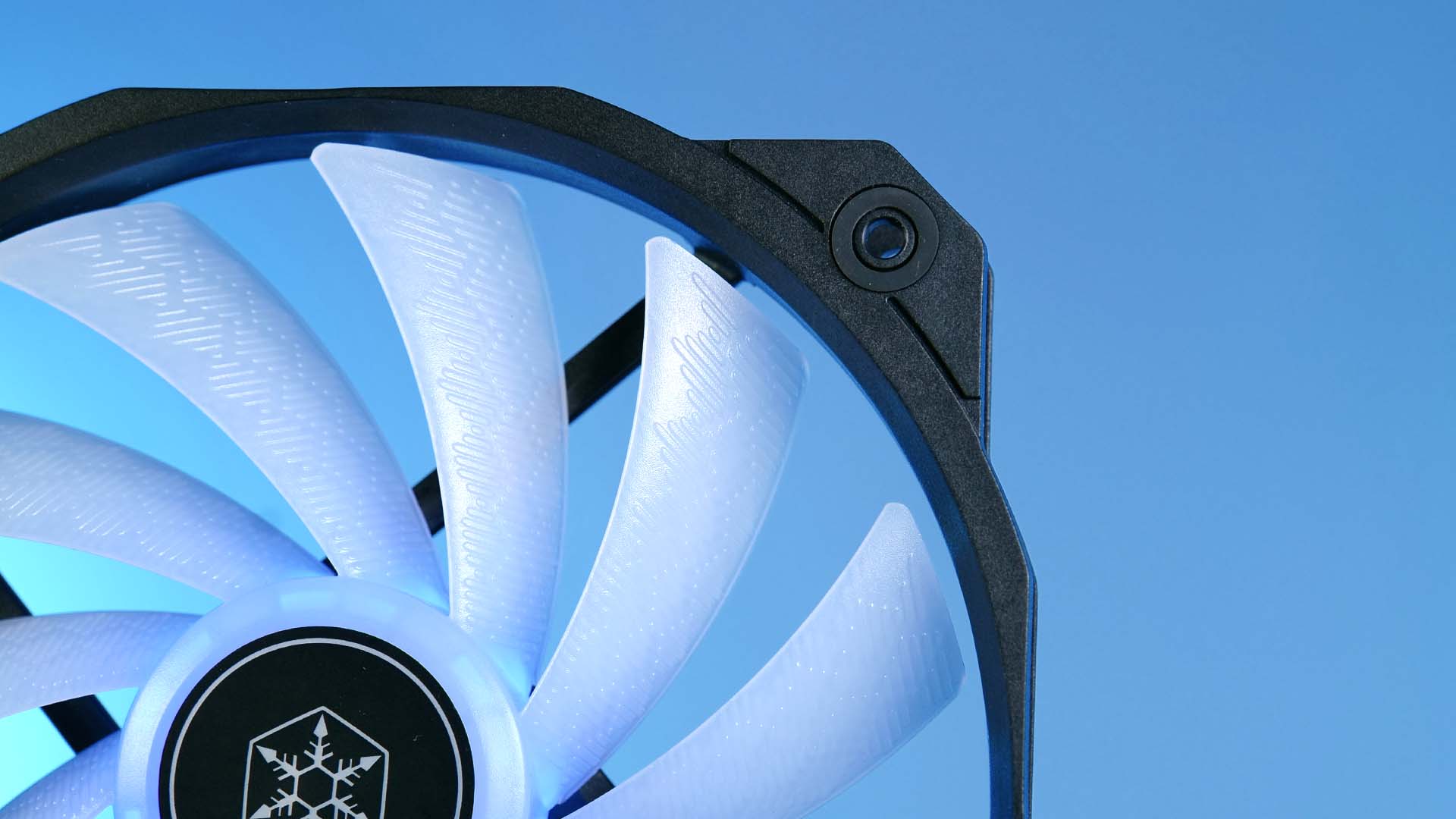
The ARGB implementation is also fine in our opinion. Although the light is not able to reach the outer border of the frame, this is entirely due to the fan's size. And as the size is directly responsible for the fan's performance, we believe this to be acceptable.
As far as connecting the fan is concerned, we do not truly believe that Silver Stone used the right approach. Although having a female header on the motherboard makes daisy-chaining a lot easier and allows to create less cable clutter inside a case, we had negative experiences with these types of connectors in the past. Because of their fragility, and the fact that due to their position, you are inevitably forced to pull on only the cables, we do not feel confident that they will survive a lot of installation and removal cycles.
However, credit, where credit is due, thanks to this approach, installing 2 Shark Force fans right next to each other, requires exactly the same amount of cabling as a single one.

The most important aspect of this fan, however, is its performance. In this category, the Shark Force was able to score some major points. Thanks to its enormous 160mm size, they were able to reach the top portion of the max-performance chart while keeping a respectable noise-to-performance ratio comparable to an Arctic F14, just with a lot mot potential performance headroom.
Due to the last reason alone, we can absolutely recommend the Shark Force for your next build. However, please make sure that they actually fit before making a purchase. Having 140mm fan mounting holes alone does not mean that those fans will fit, so double-checking is highly recommended.


Noctua NH-U9S Review
The Noctua NH-U9S has to fill a very delicate spot. Sitting right in between big full-tower and small form factor CPU coolers
Read More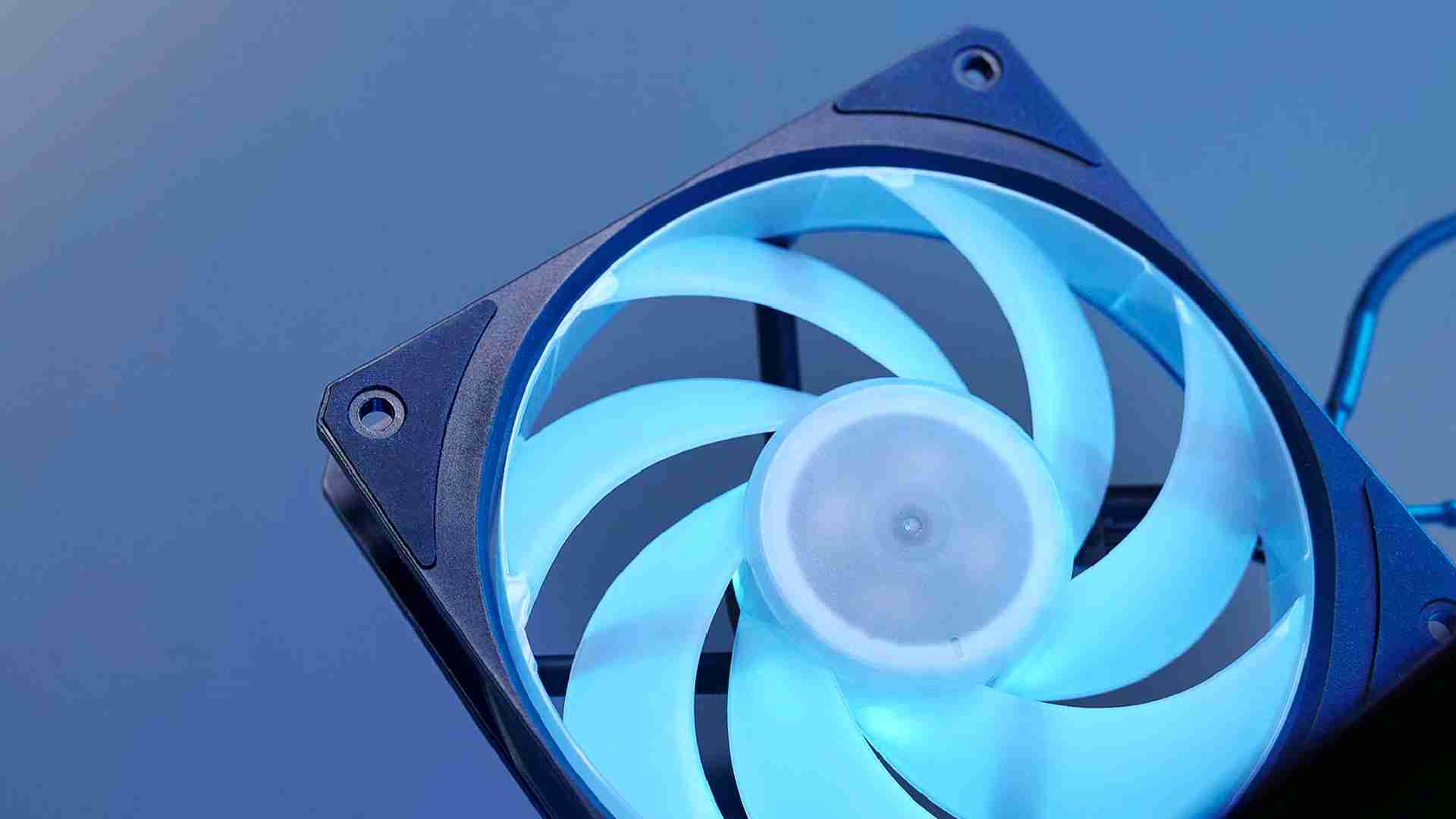
Cooler Master Mobius 120P
The new Mobius 120 Fan from Cooler Master had a pretty respectable noise-to-performance ratio. The Mobius 120P is trying to t
Read More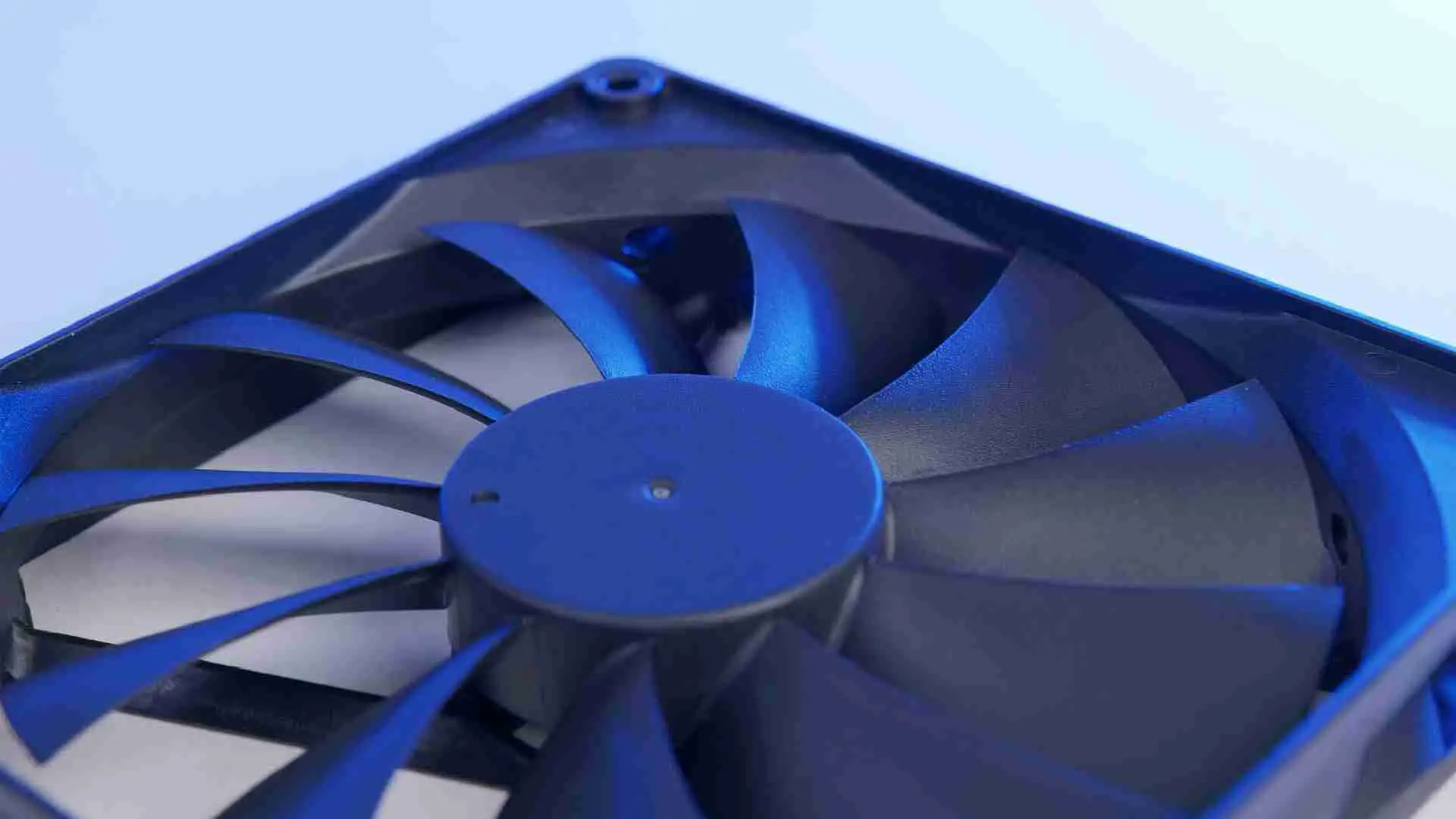
Alphacool Core 140 2000RPM Review
Apart from being incredibly affordable, Alphacools Core lineup of fans is known to maximise on performance whilst forgetting
Read More
Xilence XPF120X.B.PWM Review
Lets have a closer look at Xilences newest XPF120X.B.PWM fan, the fan for every use case. Used on their new AIO, Air Cooler,
Read More